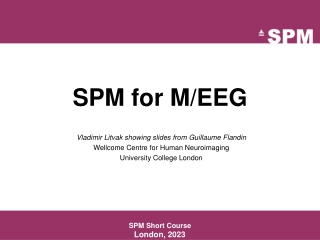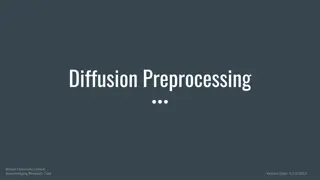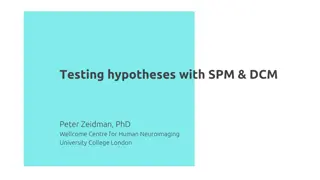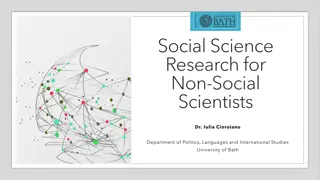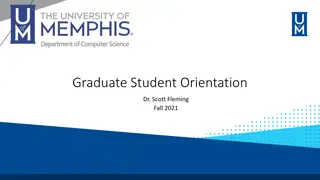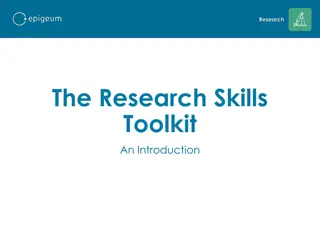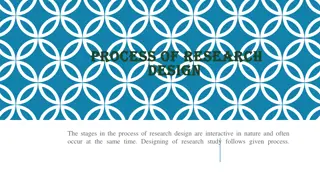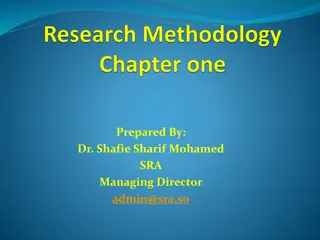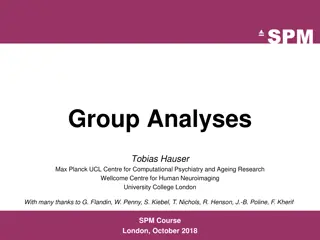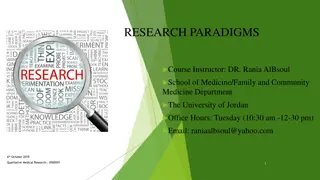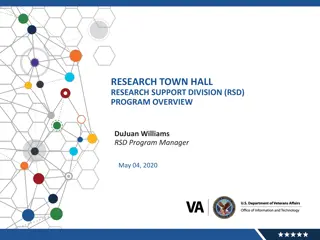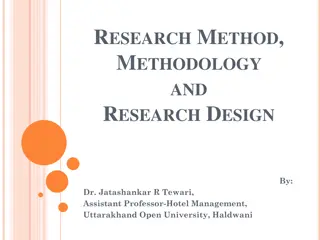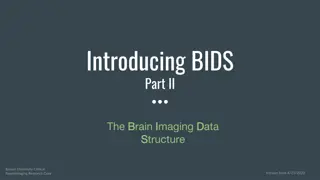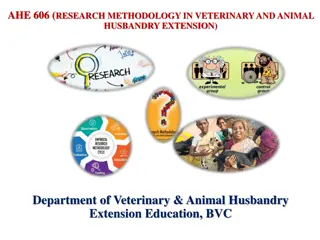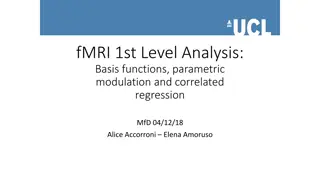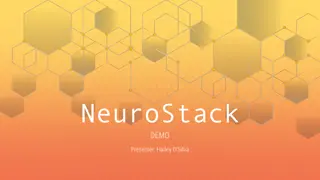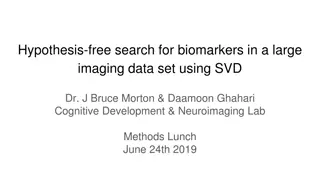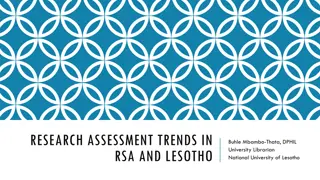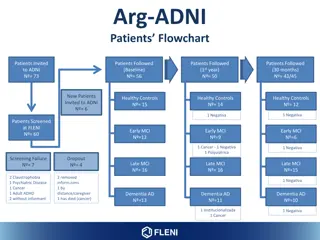SPM for M/EEG
The powerful SPM software for routine statistical analysis of functional neuroimaging data from M/EEG. Learn about its origins, advancements, and applications in a comprehensive short course.
0 views • 17 slides
Addressing Contemporary Challenges in Research Security Program Development
The Workshop to Inform Development of the Research on Research Security Program (RRSP) focuses on safeguarding the research enterprise amidst evolving global threats. Led by Dr. Rebecca Keiser and Dr. Shawna Cox, the program aims to balance security measures while maintaining an open and collaborati
3 views • 16 slides
Understanding Diffusion Weighted Imaging (DWI) in Neuroimaging Research
This content delves into the significance of Diffusion Weighted Imaging (DWI) in studying the motion of water molecules in brain tissue. It explains how water diffusion varies in different brain matter types and explores techniques like Diffusion Tensor Imaging (DTI). The impact factors on diffusion
4 views • 25 slides
Safeguarding Canada's Research: Policy on Sensitive Technology Research and Affiliations of Concern (STRAC)
Canada's new Policy on Sensitive Technology Research and Affiliations of Concern (STRAC) aims to protect the country's research ecosystem from foreign entities posing security risks. The policy restricts funding for projects involving sensitive technology research if affiliated with military or stat
1 views • 10 slides
Understanding the Process and Types of Research Design
The process of research design involves interactive stages that occur simultaneously, leading to the designing of a research study. This includes steps in research design, classification of research design types, such as exploratory, descriptive, and experimental/causal research design. Each type se
12 views • 8 slides
Understanding Bayesian Model Comparison in Neuroimaging Research
Exploring the process of testing hypotheses using Statistical Parametric Mapping (SPM) and Dynamic Causal Modeling (DCM) in neuroimaging research. The journey from hypothesis formulation to Bayesian model comparison, emphasizing the importance of structured steps and empirical science for successful
4 views • 36 slides
Importance of Formulating Clear Research Problems
Addressing a research problem is crucial in research endeavors as it guides the process, helps in setting objectives, and determines the direction of the study. Formulating a well-defined research problem aids in understanding the research procedure, clarifying objectives, designing the research pro
14 views • 7 slides
Action Research Cycle Step 1: Plan and Implementing Research Questions
Action research involves identifying a problem, forming research questions, and creating a research plan. It aims to understand situations, evaluate, problem-solve, and generate new ideas. Defining a research topic is crucial, focusing on the rationale and relevance. Selecting manageable topics dire
8 views • 17 slides
UCC Research Support and Strategies Overview
UCC's Research Support, Policy & Strategy function, led by David O'Connell, PhD, provides comprehensive support for research activities at the university. The office manages research funding, monitors performance, and facilitates engagement with external stakeholders. UCC's involvement in Horizon Eu
3 views • 17 slides
Understanding Social Science Research for Non-Social Scientists at University of Bath
This resource delves into social science research fundamentals, encompassing types of inquiry, empirical research categories, primary and secondary research distinctions, and the importance of selecting a suitable research topic. It offers guidance on initiating research based on empirical observati
1 views • 10 slides
Graduate Student Orientation Fall 2021 - CS Department Overview
The Graduate Student Orientation for Fall 2021 at the CS Department led by Dr. Scott Fleming covers essential topics such as department mission, degree programs, faculty research areas, research impact indicators, and research opportunities within the department. Learn about the CS Department's high
0 views • 41 slides
Enhancing Research Skills with Epigeum's Research Skills Toolkit
Epigeum, a leading provider of online courseware, offers the Research Skills Toolkit, comprising five core programs designed to equip postgraduate researchers with key skills and knowledge. Developed from the Research Skills Master Programme, the Toolkit integrates interactive learning design, user-
1 views • 9 slides
Effective Proposal Writing for Health Research
Learn about the fundamentals of research proposals for health-related studies, including defining research, understanding the purposes of health research, and exploring motivation for undertaking research. Discover the difference between basic and applied research, examine types of research, and del
1 views • 70 slides
Overview of Research Problem Identification and Formulation
Understanding the importance of defining a research problem, this content delves into the selection and formulation of research problems, the definition of a research problem, reasons for defining it, methods for identifying research problems, sources of research problems, and considerations in sele
1 views • 11 slides
Understanding the Process and Types of Research Design
The process of research design involves interactive stages occurring simultaneously, leading to the creation of a structured study. There are three main types of research design: exploratory, descriptive, and experimental (or causal). Each type has its own objectives and methods. Exploratory researc
0 views • 7 slides
Understanding Research Aims, Objectives, and Hypothesis in Health Research
This content delves into the importance of defining research aims, objectives, and hypotheses in health research. It explains how research aims clarify the study's goals, objectives outline specific tasks to achieve those goals, and hypotheses help in making predictions. It also discusses the proces
1 views • 17 slides
Understanding the Essence of Research: A Comprehensive Overview
Research is a systematic pursuit of new knowledge, aiming to unveil hidden truths through data collection and analysis. This course outline delves into the fundamentals of research, covering topics such as types of research studies, importance of research, and distinctions between pure and applied r
3 views • 32 slides
Epic Tools for Clinical Research by Shara Power, RN, BSN, OCN
Explore Epic tools for clinical research developed by Shara Power, a skilled application developer specializing in EPIC Beacon Oncology at UIHC Healthcare Information Systems. Learn about managing research study records, investigational study medication orders, and the process for creating and using
0 views • 26 slides
Neuroimaging Group Analyses: Methods and Results Overview
In this collection of images and descriptions, various aspects of group analyses in neuroimaging research are explored, including statistical parametric mapping, first-level analyses, and assessing different subjects using fixed effects, random effects, and mixed effects analysis. The content delves
1 views • 38 slides
Understanding Research Paradigms in Qualitative Medical Research
Delve into the world of research paradigms in qualitative medical research with a focus on the key differences between objective and subjective research, the meaning of research paradigms, components of research paradigms, types of research paradigms, and how paradigms guide the selection of researc
0 views • 42 slides
Overview of VA Research Support Division Program
The Research Support Division (RSD) program at the VA focuses on providing guidance and implementing enterprise information security standards for stakeholders involved in research programs. Their mission includes ensuring data security, risk management, and transparency while advancing VA Research.
2 views • 16 slides
Understanding Research Methods and Methodology in Hotel Management
Research in hotel management involves a structured process of inquiry to collect, analyze, and present information on various topics. The research process typically consists of steps like posing a question, collecting data, and presenting answers. Researchers follow a scientific method to identify p
0 views • 22 slides
Guidelines for Selecting Research Project Topics in Environmental Health
Research is crucial for addressing environmental health issues. Choosing a good research topic is the first step towards effective research. This paper discusses the meaning, characteristics, types of research, and the research process to help in selecting appropriate research topics. Understanding
0 views • 15 slides
Comprehensive Research Training Programme in Social Sciences
Delve into the Research Training Programme offered by the Graduate School of Social Sciences, led by Professor Mark Tranmer. Explore the importance of research methods training, course offerings under the Research Training Programme (RTP), the Certificate in Social Science Research Methods (CSSRM),
6 views • 11 slides
Understanding BIDS File Naming Conventions
BIDS (Brain Imaging Data Structure) establishes standardized naming conventions for organizing neuroimaging data. It outlines rules for labeling subjects, sessions, tasks, runs, modalities, and exceptions. The structure helps maintain consistency and facilitates data sharing and collaboration in the
7 views • 11 slides
Understanding Research Methodology in Veterinary and Animal Husbandry Extension
Delve into the concept, nature, and scope of research in social sciences within the context of veterinary and animal husbandry extension. Explore types of research, variables, problem formulation, hypothesis testing, and the importance of research in generating new knowledge. Discover the process of
0 views • 15 slides
Understanding fMRI 1st Level Analysis: Basis Functions and GLM Assumptions
Explore the exciting world of fMRI 1st level analysis focusing on basis functions, parametric modulation, correlated regression, GLM assumptions, group analysis, and more. Dive into brain region differences in BOLD signals with various stimuli and learn about temporal basis functions in neuroimaging
0 views • 42 slides
Introduction to NeuroStack for Cloud-Based Neuroimaging Processing
Explore the capabilities of NeuroStack, a cloud-based platform for neuroimaging processing on AWS. Learn how to convert file types, process subjects in FreeSurfer, and leverage AWS for scalable computing. Discover the steps to install NeuroStack, its functionalities, and the services it offers for e
0 views • 12 slides
Sustainable & Resilient Research Enterprise Series
Join the COR Summer Meeting Series for insights on sustaining research amidst COVID-19 and beyond. Discover key topics like managing international research, eradicating sexual harassment, public impact research, and the future of university research. Share your stories of Public Impact Research on C
0 views • 19 slides
Efficient fMRI Experimental Design: Maximizing Neurovascular Response
Understanding the importance of correctly designing fMRI experiments is crucial for testing specific hypotheses by manipulating stimulus types, timing, and participant instructions. Types of experimental designs include categorical, factorial, and parametric designs, each serving different purposes
0 views • 35 slides
Uncovering Brain Biomarkers Using SVD in Neuroimaging Data
Explore the methodology of hypothesis-free searching for biomarkers in large imaging datasets using Singular Value Decomposition (SVD). Dr. J. Bruce Morton and Daamoon Ghahari delve into the application of SVD and General Linear Modeling to identify potential biomarkers for ADHD and other neuropsych
0 views • 12 slides
Icelandic Research Fund 2015: Enhancing Scientific Research and Education
The Icelandic Research Fund (IRF) aims to enhance scientific research and education in Iceland by awarding funding to research projects led by individuals, teams, universities, research institutes, and companies. Principal investigators must have completed graduate studies and experience in running
0 views • 22 slides
Challenges in Self-Help Research in Germany
Exploring the landscape of self-help research in Germany reveals various challenges and obstacles faced by researchers in studying self-help initiatives. The research delves into different aspects such as research scope, involvement of various groups, and the entities conducting research in this dom
0 views • 14 slides
Memorial University Research Strategies Overview
Memorial University's research strategies focus on attracting, retaining, and supporting researchers, fostering an environment of research excellence, engaging with community partners, and supporting fundamental and applied research. The university's strategic priorities include synergy in applicati
0 views • 11 slides
Understanding Psychophysical Methods in Cognitive Neuroscience
This collection of images explores the field of psychophysics, focusing on perception, reality, behavior, and the analysis of cognitive functions. The images delve into the reasons for studying psychophysical methods, the complexity of neuro-cognitive phenomena, and the importance of behavioral meas
0 views • 21 slides
Advanced MRI Protocols for Neuroimaging Studies
Cutting-edge MRI protocols, ADNI 3, aim to enhance brain imaging techniques for clinical trials, focusing on precise measurements, disease detection, and potential treatment evaluation by leveraging advanced imaging methods like ASL, dMRI, and TF-fMRI.
0 views • 20 slides
Research Assessment Trends in RSA and Lesotho: Issues, Challenges, and Forward Strategies
Research assessment in RSA and Lesotho involves evaluating research quality, measuring inputs, outputs, and impacts using both qualitative and quantitative methodologies. The prevailing practices include assessing research productivity for progression and utilizing various assessment mechanisms to e
0 views • 7 slides
Argentina Alzheimer's Disease Neuroimaging Initiative Overview
The Argentina Alzheimer's Disease Neuroimaging Initiative (arg-ADNI) is a comprehensive program focusing on the early detection and characterization of Alzheimer's disease (AD) and related conditions. The initiative involves inviting and following patients through various stages, including baseline
0 views • 5 slides
Exploring Research Design and Funding Priorities in Northern Ireland
Dive into the world of research at the upcoming Application and Research Design Workshop scheduled for Friday, 28th May 2021. Discover the strategic priorities driving impactful research initiatives, learn about current research projects, funding processes, and collaborations. Explore the rich histo
0 views • 37 slides
Writing Research Papers Effectively: Guidelines and Steps
Effective writing for research involves developing a good research idea, writing a literature review, and understanding the key elements of writing research articles. This process includes coming up with a strong research question, gathering relevant information, creating an outline, writing the dra
0 views • 26 slides
